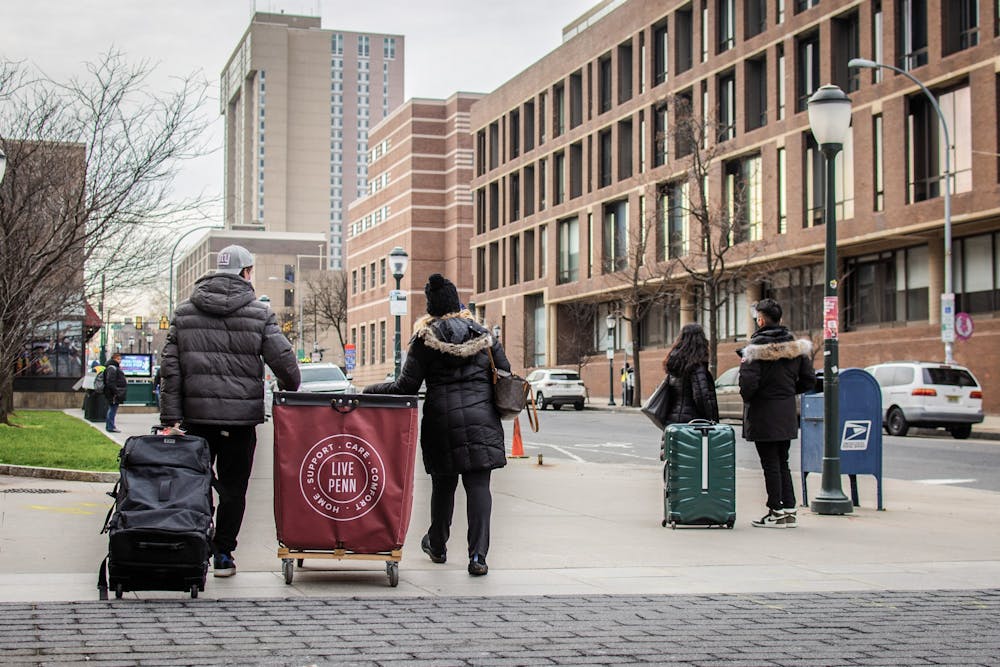
On Dec. 23, Penn announced that classes would be conducted virtually for the first two weeks of the spring semester. Move-in, which was originally scheduled for Jan. 8, was delayed one week, but an early move-in application was made available, and students flocked to request the accommodation for a variety of reasons: non-refundable travel expenses, time zone differences, binding academic and athletic commitments, etc.
Though the early move-in application opened shortly after Penn announced the delay, applications would not be reviewed until Jan. 5. Many applicants were blindsided when on Jan. 7, just a day before the anticipated early move-in date, their applications were rejected. Of the over 1100 students who applied, around 40% were left to struggle to find alternative housing for what the Review Committee (Student Intervention Services, Penn First Plus, Student Financial Aid, and International Student and Scholar Services) referred to as an “additional, short week.” Though the Omicron surge has left many schools, including Penn, scrambling, Penn’s handling of the situation was not only distasteful, but concerning for a school committed to responding to the diverse needs of its students.
First-generation, low-income (FGLI) students and international students, many of whom rely on Penn for a stable environment throughout the academic year, were particularly affected by the unanticipated rejection. College first-year and FGLI student Mika Castillo told the DP that her work-study commitment, non-refundable travel arrangements, and shared room made staying home for the additional week impossible. While Penn has since said that they would reimburse students affected by the one-week delay, is a refund for a plane flight substitutable for a week-long environment detrimental to learning?
Admittedly, these are tumultuous times. Penn, like ourselves, is grappling with the ever-changing narrative of a new variant. During the week of Jan. 2 to Jan. 8, for instance, students in isolation rose from 750 to 1,078, taking up about 50% of Penn’s isolation dorm capacity — and that is with a substantially smaller on-campus student body. In a statement to the DP regarding early-move-in limitations, executive director of Penn First Plus Marc Lo invoked the University’s increasing positivity rate — since Dec. 19, there has been a cumulative 14.9% prevalence.
Rejection may have been inevitable, even, to an extent, understandable. However, the early move-in rejection email, which referenced the “innate talent” of the student body, was insufficient, impertinent, and inconsiderate to a vulnerable student population. Rather than cite resources to alleviate student concerns, the tone-deaf email expressed that the Review Committee would be unable to consider appeals. As it assured rejectees of their abilities to find housing for the “additional, short week,” it trivialized the very real financial and logistical burdens that its students faced as a result of an already strenuous situation. SEAS sophomore and FGLI student Declan Cambey said, “The phrase about the ‘innate talents of our undergraduates’ is a slap in the face.” He sees it as a means for Penn to “put accountability on the students and write this off as an inconvenience easily dealt with."
With the Omicron variant contributing to an unprecedented surge in COVID-19 cases nationwide, comprehensive and sympathetic communication is vital; however, the last few weeks have seen Penn shirk this responsibility and pass it onto its students. Instead, the administration cited the “short window of review” to explain its mass rejection of early move-in requests. The Jan. 5 review date is hard to justify. In a time that necessitated swift communication, many students were only notified 24-48 hours before their scheduled travel plans. While Penn’s early move-in policies attempted to ensure the well-being and safety of the Penn community, the administration abandoned its commitment to socioeconomic and cultural diversity. What may have been a well-intentioned decision fails to grasp that perhaps these pursuits are not mutually exclusive — you cannot pledge your commitment to the safety and well-being of your students and then deny them critical temporary housing amid a national crisis.
This is an unprecedented time. It may be understandable for Penn’s move-in policies to be underwhelming; however, Penn’s insensitive communication, which undermines the struggle of its students, is inexcusable. In a time of uncertainty, empathy can go a long way. If nothing else, the school’s disastrous early move-in policies highlight one thing: Penn must do a better job of prioritizing its students’ needs.
KAYLA COTTER is a College first year from Manalapan, NJ. Her email is kmcotter@sas.upenn.edu.
The Daily Pennsylvanian is an independent, student-run newspaper. Please consider making a donation to support the coverage that shapes the University. Your generosity ensures a future of strong journalism at Penn.
Donate






